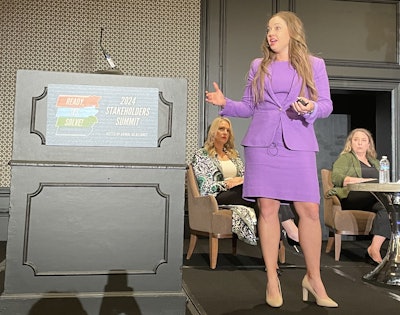
Many in animal agriculture are looking for a solution to California’s Proposition 12 and similar state laws, but one proposed fix for it, the Ending Agriculture Trade Suppression (EATS) Act, does not seem to be that solution.
In fact, Chelsea Good, the Livestock Marketing Association’s vice president of government and industry affairs, said the EATS Act was “dead on arrival.”
Good talked about Proposition 12, and possible ways to nullify it while speaking at the 2024 Animal Agriculture Alliance Stakeholders Summit on May 9 in Kansas City, Missouri.
The EATS Act, introduced in 2024 by Sen. Roger Marshall, R-Kansas, and Rep. Ashley Hinson, R-Iowa, was designed to counter Proposition 12 and similar laws which only allow the sale of pork from farms that don’t use gestation crates and eggs from farms that use cage-free laying systems. Mashall and others have said California has no right to regulate how agricultural production is done in other states, and that Proposition 12 violates the Commerce Clause of the U.S. Constitution.
Good explained that when a challenge to Proposition 12 went to the U.S. Supreme Court, the majority of the justices found that there was no violation to the Commerce Clause, and that there was no protectionist intent.
However, Good said, the court did rule that Congress does have authority under the Commerce Clause to preempt state law affecting interstate commerce.
The status of the EATS Act
The first congressional attempt to preempt Proposition 12 was the EATS Act.
“Has this been a super-popular, uncontroversial piece of legislation? It’s been popular with some but it’s also been really controversial. There are many detractors, some on the left don’t like it because it came out of animal welfare and (they) want to be very sensitive to animal welfare. They’re also generally big fans of ballot initiatives,” she said.
But there is a clear divide on the political right, Good noted.
“Most Republicans want to fix the situation … but we have some within that party, especially the far right, they have a lot of concerns on what (this does) to state rights in the future. There’s also questions about that private right of action and if the bill is too broad. I think the EATS Act is dead on arrival,” she said.
Outside of Congress, most of the EATS Act’s most vocal opponents have been the animal rights community, which Good said isn’t surprising. But also opposed to it is the Organization for Competitive Markets (OCM), which has a reasonably large following of livestock and poultry producers.
Good said OCM is making “this weird China argument,” which she doesn’t “get.”
A press release from OCM concerning its stance on the EATS Act doesn’t specifically explain that argument, but it does say the absence of rules like Proposition 12 “Would create an environment in which large Chinese corporations … can easily expand across all 50 states without having to comply with state laws that protect rural communities, American farming families and consumers.”
Strengthening Antitrust Enforcement for Meatpacking Act
Realizing the EATS Act is poised to go nowhere, Good said an alternative to it is needed.
Sen. Josh Hawley, R-Missouri, in September 2023 proposed such an alternative, called the Strengthening Antitrust Enforcement for Meatpacking Act.
She said it was “slightly more targeted” than the EATS Act, including having a carve-out for animal health issues.
So far, Good said, Hawley has failed to gain any co-sponsors, leading her to conclude it is not the answer to Proposition 12, either.
Solution still in sight
After mentioning the dismal response to Hawley’s bill, Good showed a picture of U.S. Secretary of Agriculture Tom Vilsack and House Agriculture Committee Glenn “GT” Thompson.
Of Thompson, Good said: “He’s committed to finding a solution to this, and I know GT and I think he will.”
And of Vilsack, she said: “He is also really concerned about this. He said in a hearing that 12% of the market is changing the rules for the entire market, and if Congress hasn’t figured it out, it will be chaos.”
While the two are from differing political parties, they share a “lockstep” vision to counter Proposition 12, and Good is optimistic they will work together to do just that.
















